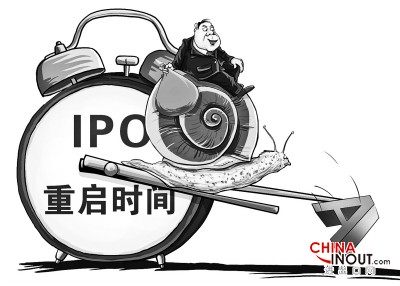本周五,,中國(guó)證監(jiān)會(huì)宣布其將重啟IPO(首次公開(kāi)募股)。今年七月,,證監(jiān)會(huì)暫停IPO來(lái)減緩股市行情暴跌所帶來(lái)的的沖擊。
中國(guó)證監(jiān)會(huì)的發(fā)言人鄧舸于本周五的新聞例會(huì)上宣布了此消息,。
證監(jiān)會(huì)稱此前暫緩發(fā)行的28家公司將率先完成發(fā)行,,并補(bǔ)充說(shuō)這些公司有兩周時(shí)間做準(zhǔn)備,,第一批上市的10間公司將在11月20日之后發(fā)行股票。
此公告標(biāo)志著中國(guó)股市在夏季的動(dòng)蕩之后終于趨于穩(wěn)定,,本周的滬深300指數(shù)達(dá)到了六月以來(lái)的最好水準(zhǔn)。
在八月份跌至谷底之后,,中國(guó)大陸股指攀升超20%,預(yù)示著牛市的回歸,。
國(guó)都證券的分析師肖世俊表示:“在中長(zhǎng)期內(nèi),這對(duì)于股市來(lái)說(shuō)是利好消息,。因?yàn)樗鼤?huì)引入新鮮資金。然而這也會(huì)給投資者們帶來(lái)一些心理壓力,,他們擔(dān)心短期內(nèi)會(huì)有現(xiàn)金分流的狀況發(fā)生。”
今夏股市的崩盤(pán)的部分原因是大量的IPO沖擊泡沫化和高度杠桿化的市場(chǎng),。
湯森路透的數(shù)據(jù)顯示,,截至六月中旬。即證監(jiān)會(huì)暫停IPO以前,中國(guó)大陸的公司已經(jīng)在IPO募得資金共234億美元,,遠(yuǎn)遠(yuǎn)超過(guò)2014年的總額132億美金。
證監(jiān)會(huì)曾一度在每周通過(guò)40家公司的申請(qǐng),,而二次發(fā)售的獲準(zhǔn)數(shù)量則更多,。
肖世俊稱:“我認(rèn)為此次重啟會(huì)再次引發(fā)股市潰敗,。六月份的高杠桿已經(jīng)破壞了基本面,。在監(jiān)管者冒進(jìn)的舉措之下,如今的市場(chǎng)根本不存在基本面了,。”
海通證券的分析師張琦表示,盡管IPO重啟,,但仍受到定價(jià)受限和其他政策的影響,,他希望散戶們能夠認(rèn)真定奪究竟能在其中獲得多少利益,。
“我也希望IPO規(guī)則能有更多的變化,包括對(duì)于主要利益相關(guān)人的股份認(rèn)購(gòu)配額的規(guī)定”
中國(guó)證監(jiān)會(huì)稱其將改變當(dāng)前IPO審批機(jī)制,,將審慎監(jiān)管條件改為信息披露要求。
然而,,本意是防止內(nèi)部人員欺詐投資者的規(guī)定抑制了IPO股價(jià),給具有認(rèn)購(gòu)資格的投資者們牟利空間,。
首日,,幾乎所有上市公司的股指都上升了最大限度44%,,并且大多數(shù)在接下來(lái)幾周內(nèi)持續(xù)走高,上升了三位數(shù),。
IPO被超額認(rèn)購(gòu),超出了130倍的數(shù)目,。并且來(lái)自熱情高漲的認(rèn)購(gòu)者的第三方資金暫時(shí)引入了數(shù)萬(wàn)億價(jià)外期權(quán),,從而使利率扭曲。
證監(jiān)會(huì)稱在其官網(wǎng)的一份文件指明,,為減少小型上市公司的負(fù)擔(dān),其將取消第三方托管要求,,并取消少于200萬(wàn)股的IPO的建檔時(shí)間。(中國(guó)進(jìn)出口網(wǎng))
China's securities regulator said on Friday it would allow the resumption of initial public offerings in China, lifting a suspension put into effect in July as regulators desperately tried to slow a devastating stock market crash.
China Securities Regulatory Commission (CSRC) spokesman Deng Ge made the announcement at a weekly news conference in Beijing.
The CSRC said that 28 companies which had seen their already-approved listings halted by the freeze would be the first out of the gate, adding they have two weeks to prepare for the resumption, with the first batch of 10 companies launching after November 20.
The announcement comes after signs Chinese stock markets have finally stabilized after a rocky summer; this week the CSI300 index .CSI300 posted its best weekly performance since June.

Mainland stock indexes are up by more than 20 percent from the bottom of a crash struck in August, technically marking a return to a bull market.
"This is a good news for the stock market in the mid-to-long term as it will introduce fresh cash, though it will also bring some psychological pressure to investors as they are afraid of diversion of the cash in the short term," said Xiao Shijun, analyst at Guodu Securities in Beijing.
The stock market crash over the summer was partly blamed on a spate of IPOs hitting an already frothy and heavily leveraged market.
Companies in mainland China had raised $23.4 billion in IPOs in 2015 through mid June before regulators suspended deals, far surpassing the $13.2 billion in all of 2014, Thomson Reuters data showed.
At one point the CSRC was letting 40 companies list every week and there were even more secondary issuances.
"I don't think the resumption will cause a market stampede again," said Xiao. "In June, the fundamentals were distorted by high leverage, which does not quite exist in the current market after regulator's aggressive moves."
Zhang Qi, analyst at Haitong Securities in Shanghai, said he expected retail investors to be skeptical of how much they will benefit from the resumption of IPOs, which were highly distorted by pricing restrictions and other policies.
"I am also expecting further changes to IPO rules, including to the quota for major stakeholders share of subscriptions."
The CSRC has said it would migrate away from its current approval system for IPOs to system in which companies merely register to list without requiring regulatory clearance.
However, rules aimed at preventing insiders from fleecing investors suppressed IPO pricing, unintentionally creating an easy profit for those investors able to subscribe.
Nearly every listing in China rose by the maximum allowable 44 percent on the first day, and most went on to rise into triple digits in the following weeks.
As a result, IPOs went oversubscribed by an average of 130 times, and the escrowing of cash by aspiring subscribers temporarily sucked trillions out of the money markets and distorted interest rates.
The regulator said in a document posted on its website that it was eliminating the escrow requirement, and also eliminating the bookbuilding period for IPOs with fewer than two million shares, to reduce costs for smaller listing companies.











